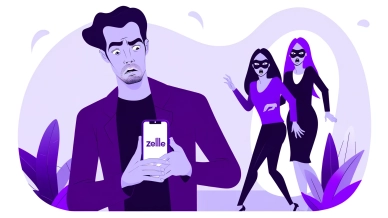Zelle Scams: How to Use the Payment App Safely and Securely

Using a mobile app to send and receive funds from friends and family or pay for products and services on the internet is a common thing for us today. Online payment services like Zelle have gained immense popularity for the unparalleled convenience they offer. However, having your finances at your fingertips at all times comes along with an increased risk of scams and fraudulent activities. For instance, as Zelle gained popularity, the instances of various criminal activities on the platform also became more common.
Is Zelle a scam, then? How safe is Zelle? In this guide, we’ll shed light on the potential risks associated with using the service and provide actionable tips on how to safeguard yourself against such dangers.
Most Common Zelle Scams
Zelle scams are deceptive schemes fraudsters use to manipulate their targets into sending money through the payment app. Scams through Zelle often employ loopholes in the platform’s transaction process or prey on users’ trust.
How can people scam you on Zelle? Fraudsters tend to exploit various aspects of this payment processor, including instant transfer feature, user-to-user operations, and the perception of security associated with bank-affiliated payment systems. Scammers create a sense of urgency or credibility to push users into making hasty decisions.
Besides, malicious actors often impersonate legitimate entities or leverage social engineering tactics to establish rapport with their targets. They assume false identities or fabricate convincing narratives to obtain the users’ savings.

Notably, Zelle transactions are irreversible, which amplifies the risk and severity of financial losses in case of fraud. Plus, the anonymous nature of these transactions makes it really tough to track scammers down or get the victims’ money back.
So, how can you get scammed through Zelle? Here are some of the most common Zelle scams you should keep an eye on.
1. Fake Purchase or Sale
Fraudsters pose as legitimate sellers on online marketplaces, social media platforms, or ad websites. They offer attractive deals on items such as electronics, tickets, or other high-demand products. Once a buyer expresses interest, the scammer insists on payment through Zelle, citing convenience or a need for immediate funds. After the payment is made, the pseudo-seller vanishes without delivering the promised item.

2. Rental Swindles
Impostors may target individuals searching for rental properties. Using stolen photos and descriptions, they post fake listings on rental websites or online marketplaces. After gaining the victim’s trust, the criminal requests a deposit or advance rent payment through Zelle. Subsequently, the victim discovers that the rental property either does not exist or is not owned by the scammer.

3. Phishing Scams
Phishing attacks involve fraudulent messages or emails that mimic legitimate communications from the Zelle service. They typically request users to provide sensitive information, such as login credentials or verification codes, under the guise of account security or verification purposes. When swindlers obtain the info, they can access the victim’s Zelle account and take hold of their funds.

4. Romance Scams
Scammers register fake profiles on dating sites or social media to spark up romantic connections with unsuspecting victims. As the swindler builds trust and intimacy with the victim, they fabricate a story about a financial emergency or hardship to ask for help via Zelle payment. Once the funds are forwarded, they disappear, leaving the victim emotionally and financially drained.
How to Stay Away From Zelle Scams: Tips for Safe Use
On reading the previous section, you might wonder, “How secure is Zelle?” While not fraud-proof (no other similar system is fraud-proof, by the way), Zelle is a safe and reliable payment service. When dealing with online transactions, you should stay alert and prioritize security. By understanding the methodology behind common scamming schemes, you can protect yourself from falling victim to them. Below are a few practical tips that can help avoid potentially dangerous situations.
- Verify Recipient Info: Always double-check the recipient’s identity to avoid sending money to the wrong person. Likewise, verify the identity and legitimacy of anyone who contacts you for payments;
- Use Trusted Contacts: Whenever possible, limit Zelle transactions to trusted contacts such as friends, family, or reputable businesses. Try to stay away from unfamiliar individuals or entities;
- Activate Two-Factor Authentication: Many banks and financial institutions offer two-factor authentication (2FA) options for Zelle transactions. Enable this feature to better secure your Zelle account;
- Watch for Phishing Attempts: Watch out for unexpected messages or emails asking for your personal or financial details. Real companies won’t fish for sensitive info;
- Educate Yourself: Stay informed about common gaffles and fraud tactics targeting Zelle users. Knowledge is your best defense against malicious schemes.

If you encounter any issues or suspect fraudulent activity on your Zelle account, you can immediately report a scam to Zelle or contact your bank support team to secure your funds.
Conclusion
Is Zelle safe? While the platform offers robust security features to protect users’ financial information and transactions, it’s not entirely immune to online threats and fraudulent actions. So, it should be used responsibly and with caution to achieve maximum secure experience. Remember, any payment system is only as protected as you are careful when handling it.
FAQ
How is Zelle different from other payment apps?
Unlike many other payment apps, Zelle is deeply integrated with major banks and financial institutions in the US. Not only does it allow for direct transactions from bank accounts and simplify verification processes, but also enables users to send and receive funds without incurring any fees.
What are some alternatives to Zelle?
With no minimum balance requirements and overdraft fees, Zelle is a lucrative choice for many users. Yet, it’s not the only reliable and efficient P2P system out there. If you feel unsafe about potential scams through Zelle, a few decent alternatives to it include Venmo, Cash App, PayPal, and some others.
How can I report a scam on Zelle?
To report Zelle scams, you can contact their support service directly at 1-844-428-8542.
